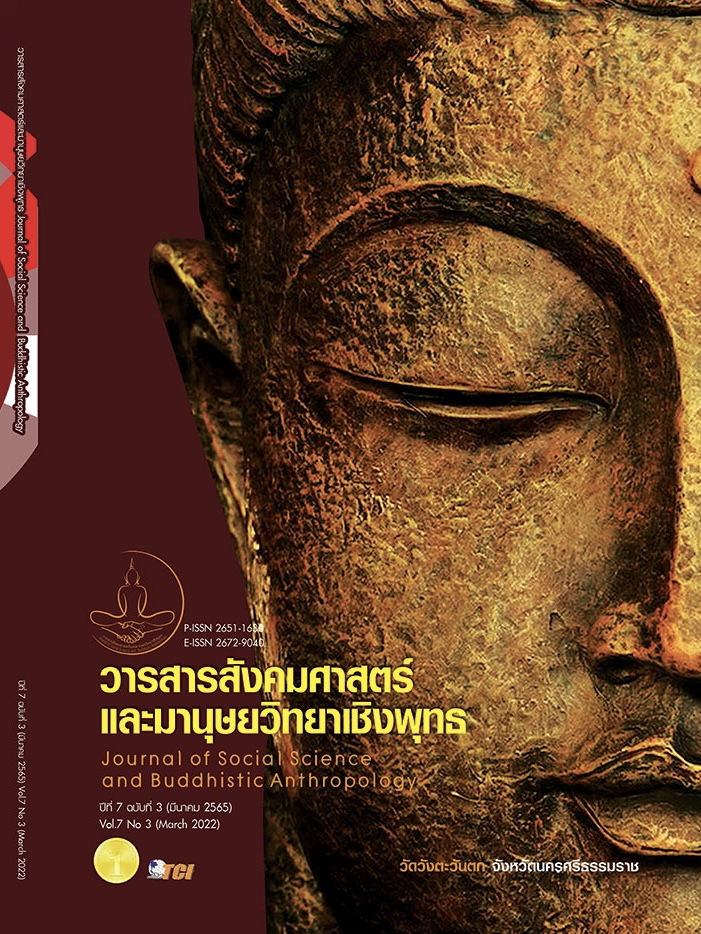LUXURY SERVICE EXPERIENCE GUIDELINES OF COFFEE TOURISM IN AYUTTHAYA PROVINCE
Keywords:
Identity, Service Experience, Luxurious, Coffee TourismAbstract
The Objectives of this research article were to 1) to find elements of Coffee Tourism in Ayutthaya province 2) to find out the identity on luxurious service experience of coffee tourism in Ayutthaya province, and 3) establish and develop luxurious service experiences of coffee business identity in Ayutthaya province. This study has employed qualitative research method through in-depth interviews with 45 coffee tourism-related participants. Research findings reveal that Gen Y coffee tourism compositions consist of; 1) Uniqueness of local raw material, which is the most mentioned topic, 2) Land of servicescape the internal coffee shop service, 3) Barista who suitable personality ability to make beverages, 4) Charming activity for emotional enhancement and enjoyment, 5) Facility and service of the coffee shop such as an area where tourists can co-working space, and 6) Transportation and basic infrastructure systems. Research findings objective 2 categorized luxurious services into 6 experiences; 1) Experiences fulfilling power of life, 2) Experiences on exceeding expectation welcoming and services, 3) Experiences on authentic value, 4) Experiences in self-learning and challenging, 5) Experiences in constructing pride, and 6) Experience on memories. Finally, offer guidelines for coffee tourism experiences that the researcher discovered five elements of the luxurious experience identity: 1) Design concept coffee Tourism Space 2) Activities to promote learning 3) Empathy 4) use of local wisdom 5) community linkage. The guideline for the development of coffee tourism in Phra Nakhon Si Ayutthaya Province
References
กนกวรรณ เวชกามา และอนิตา ประดาอินทร์. (2562). รูปแบบการสร้างตราสินค้ากาแฟพิเศษภาคเหนือตอนบนกรณี ศึกษาบ้านแม่แจ๋มอำเภอเมืองปานจังหวัดลำปาง. วารสารบริหารธุรกิจศรีนครินทรวิโรฒ, 10(2), 62-77.
กระทรวงการท่องเที่ยวและกีฬา. (2560). แผนพัฒนาการท่องเที่ยวแห่งชาติฉบับที่ 12 (พ.ศ.2560 –2564). กรุงเทพมหานคร: กระทรวงการท่องเที่ยวและกีฬา.
กองวิจัยการตลาด การท่องเที่ยวแห่งประเทศไทย. (2562). รายงานฉบับสมบูรณ์ โครงการศึกษาพฤติกรรมนักท่องเที่ยวชาวไทยที่มีศักยภาพในการใช้จ่าย ปี 2561. กรุงเทพมหานคร: การท่องเที่ยวแห่งประเทศไทย.
จิตคุปต์ ละอองปลิว. (2019). การท่องเที่ยวเมืองรอง: ทางเลือกแหล่งท่องเที่ยวเชิงสร้างสรรค์จังหวัด ราชบุรี. วารสารอินทนิลทักษิณสาร มหาวิทยาลัยทักษิณ, 14(2), 39-60.
ผู้ให้ข้อมูลสําคัญกลุ่มที่ 1 ท่านที่ 18. (2563 พฤษภาคม 2563). แนวทางสร้างประสบการณ์การท่องเที่ยวเพื่อชิมกาแฟในจังหวัดพระนครศรีอยุธยา. (ฐาปกรณ์ ทองคำนุช, ผู้สัมภาษณ์)
ผู้ให้ข้อมูลสําคัญกลุ่มที่ 1 ท่านที่ 19. (19 พฤษภาคม 2563). แนวทางสร้างประสบการณ์การท่องเที่ยวเพื่อชิมกาแฟในจังหวัดพระนครศรีอยุธยา. (ฐาปกรณ์ ทองคำนุช, ผู้สัมภาษณ์)
ผู้ให้ข้อมูลสําคัญกลุ่มที่ 1 ท่านที่ 25. (25 พฤษภาคม 2563). แนวทางสร้างประสบการณ์การท่องเที่ยวเพื่อชิมกาแฟในจังหวัดพระนครศรีอยุธยา. (ฐาปกรณ์ ทองคำนุช, ผู้สัมภาษณ์)
พยอม ธรรมบุตร. (2562). แนวทางพัฒนาการท่องเที่ยวเชิงสร้างสรรค์บนพื้นฐานอัตลักษณ์และวิถีไทยแบบ บูรณาการอย่างยั่งยืนในเขตบางกอกน้อย กรุงเทพมหานคร. Sisaket Rajabhat University Journal, 13(3), 65-75.
ภัทรพร พันธุรี. (2558). การจัดกิจกรรมการท่องเที่ยวเชิงอาหารโดยผ่านประสบการณ์ของนักท่องเที่ยวใน ประเทศไทย. Journal of Southern Technology, 8(2), 27-38.
ภูริ ชุณห์ขจร. (2563). การสร้างมูลค่าเพิ่มในกิจกรรมระหว่างการท่องเที่ยวเชิงอาหารท้องถิ่นและการท่องเที่ยวเชิงสุขภาพ. Graduate School Journal Chiang Rai Rajabhat University, 13(2), 31-45.
วัญวิริญจ์ แจ้งพลอย และวิโรจน์ เจษฎาลักษณ์. (2559). กลยุทธ์การสร้างความได้เปรียบทางการแข่งขันในการ ดำเนินธุรกิจร้านกาแฟของผู้ประกอบการรายย่อยในเขตอำเภอเมืองจังหวัดราชบุรี. Veridian E-Journal, Silpakorn University (Humanities, Social Sciences and arts), 9(3), 1331-1349.
ศุภกัญญา เกษมสุข. (2561). อัตลักษณ์และรูปแบบการดำเนินธุรกิจนำเที่ยวเชิงวัฒนธรรมเส้นทางบุญในจังหวัดอุบลราชธานี กรณีศึกษาธุรกิจนำเที่ยว. วารสารสุทธิ ปริทัศน์, 32(พิเศษ), 223-234.
สกาวรัตน์ บุญวรรโณ และเก็ตถวา บุญปราการ. (2560). พื้นที่ย่านเมืองเก่าตะกั่วป่า: การประกอบสร้างอัตลักษณ์เพื่อการท่องเที่ยวถวิลหาอดีต. วารสารมหาวิทยาลัยราชภัฏยะลา, 12(1), 61-78.
อนพัทย์ หนองคู. (2563). พฤติกรรมและปัจจัยด้านสื่อดิจิทัลทางการตลาดที่มีผลต่อการท่องเที่ยวเชิง วัฒนธรรมของนักท่องเที่ยวในเขตพื้นที่สวนดุสิต. วารสารวิจัยและพัฒนามหาวิทยาลัยราชภัฏสวนสุนันทา, 12(2), 1-15.
Buhalis, D. (2000). Marketing the competitive destination of the future. Tourism management, 21(1), 97-116.
Fuchs, M. & Weiermair, K. (2004). Destination benchmarking: An indicator-system’s potential for exploring guest satisfaction. Journal of travel research, 42(3), 212-225.
Holbrook, M. B. & Hirschman, E. C. (1982). The experiential aspects of consumption: Consumer fantasies, feelings, and fun. Journal of consumer research, 9(2), 132-140.
Jennings, G. (2010). Generation Y: Perspectives of quality. Oxford shire: CAB International.
Kim, D. & Jang, S. (2017). Symbolic consumption in upscale cafés: Examining Korean gen Y consumers’ materialism, conformity, conspicuous tendencies, and functional qualities. Journal of Hospitality & Tourism Research, 41(2), 154-179.
Lain Black and Cleopatra Veloutsou. (2017). Working consumers: Co-creation of brand identity, consumer identity and brand community identity. Journal of Business Research, 70(1), 416-429.
Miles, M. B. & Huberman, A. M. (1994). Qualitative data analysis: An expanded sourcebook. Arizona: Arizona State University.
Moreno, F. M. et al. (2017). The Characteristics of the Millenials and Their Buying Behavior. International Journal of Marketing Strategy, 9(5), 135-144.
Pine, B. J. & Gilmore, J. H. (1998). The experience economy. Harvard Business Review, 76(6), 18-23.
Wurzburger, R. et al. (2013). Creative Tourism: A Global Conversation: How to Provide Unique Creative Experiences for Travelers Worldwide. Sunstone Press: Santa Fe.
Downloads
Published
How to Cite
Issue
Section
License
Copyright (c) 2022 Journal of Social Science and Buddhistic Anthropology

This work is licensed under a Creative Commons Attribution-NonCommercial-NoDerivatives 4.0 International License.









